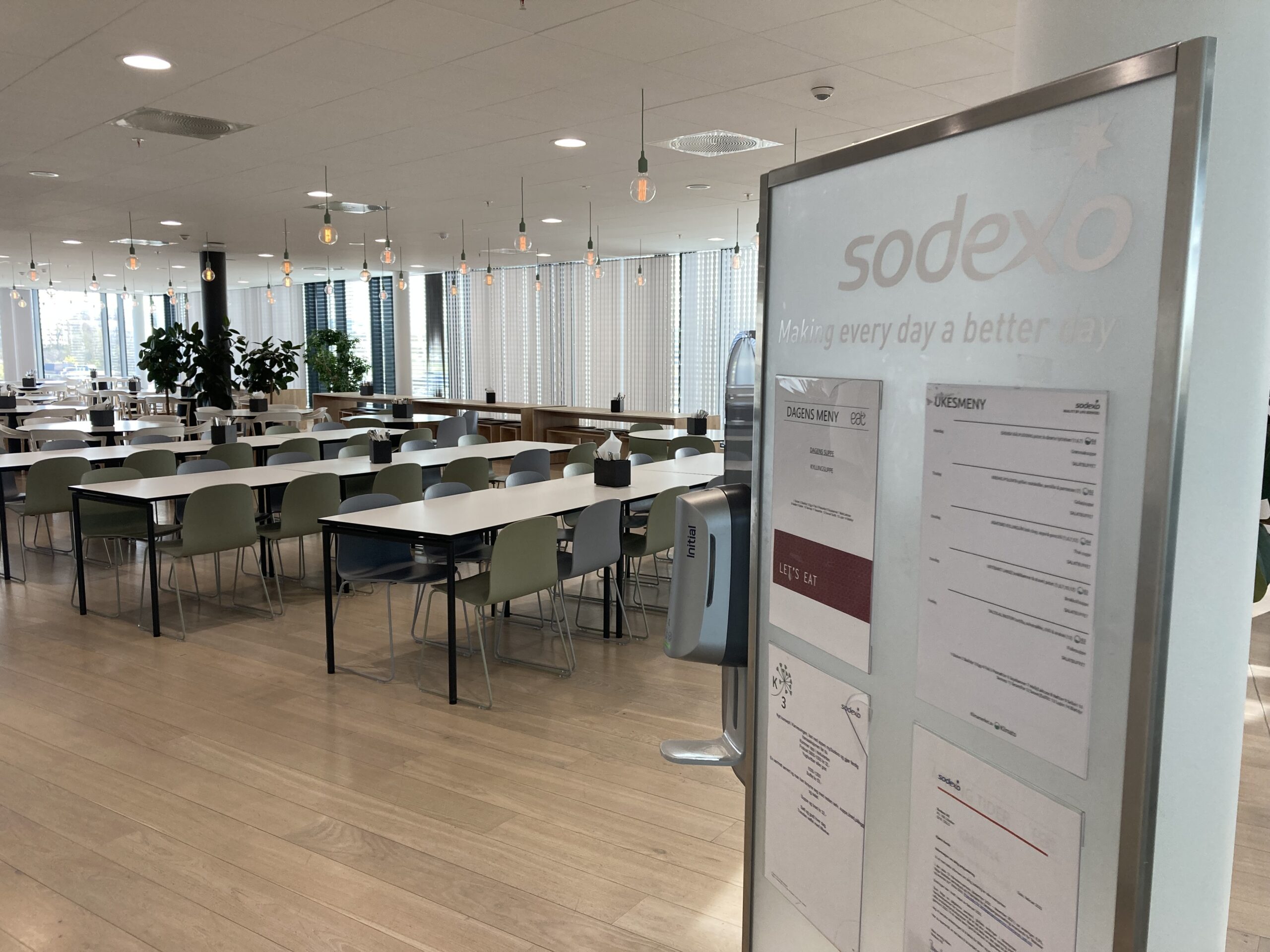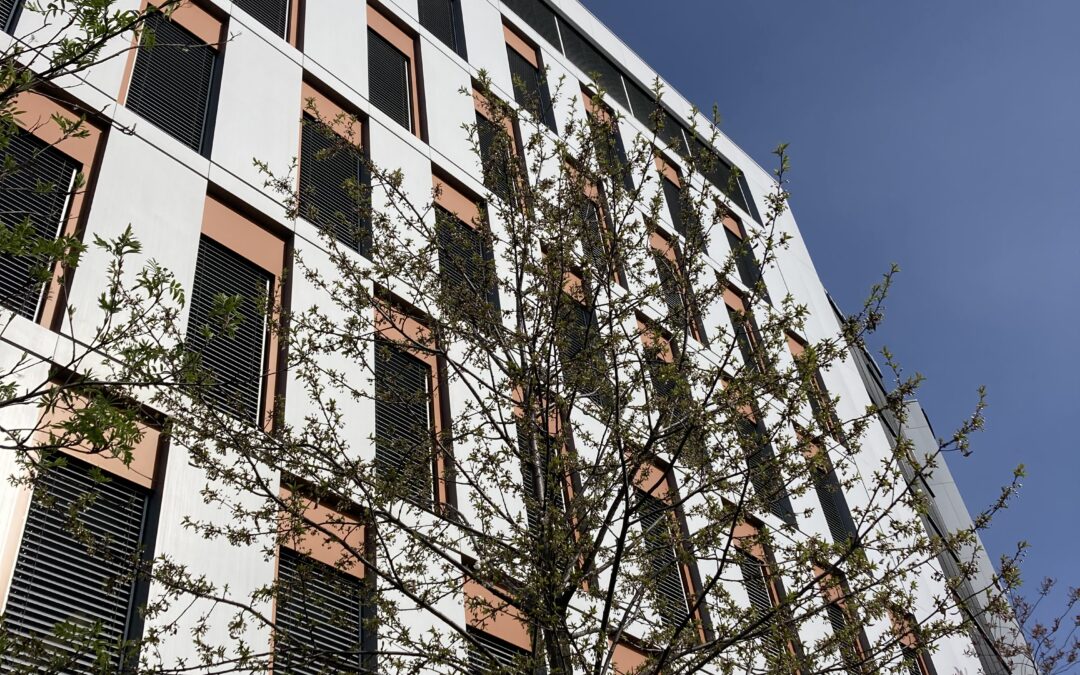For most workers, one or more meals per day are consumed at work, often purchased in a staff canteen. Assuming three meals per day; breakfast, lunch and/or dinner are commonly eaten in the workplace depending on working hours, living situation and individual preferences. This makes the workplace an important arena for the research and practice of sustainable and healthy diets.

Oslo’s FUSILLI Living Lab is “Karvesvingen 3”, an office building owned by the Norwegian real estate company Höegh eiendom. It hosts municipal agencies such as Urban Environment and Cemeteries and Burials, and private company Blue Water Shipping. Meal services are provided by global workplace service provider Sodexo. The purpose of the FUSILLI Living Lab is to explore the topic “healthy and sustainable and healthy eating in the workplace”.
As the Living Lab was established, it was necessary to map out who was in charge of what in the building, who made the food-related decisions, and what the factors that affected food offerings and consumption were. This blog presents what we have found so far.
The real estate company
Höegh eiendom, the Norwegian real estate company, is the owner of the building and contractor with meal service provider Sodexo. When deciding on staff canteen operators, Höegh eiendom typically releases tenders and receive offers from suppliers. Choosing meal service provider, Höegh eiendom main motivation is to create attractive social meeting places for tenants.
Höegh eiendom is also a contractor with the tenants. Assumably, it is important to offer spaces which attract serious tenants and to keep tenants happy. Popular common areas and meal services are important topics in this relation.
Oslo’s FUSILLI Living Lab gives opportunity to explore the extent to which real estate companies like Höegh eiendom are motivated in promoting local and sustainable food, healthy and sustainable diets. It is also interesting to understand to what extent offering healthy and sustainable meal services can attract serious and long-term tenants, and to what extent healthy and sustainable meal services might contribute to tenant satisfaction.

The meal service provider
Sodexo is a subcontractor to Höegh eiendom in Karvesvingen 3, providing meal services for tenants in the building. Höegh eiendom provides the premises including the kitchen and dining room interior.
In addition to rent, tenants however pay a mandatory “canteen fee” to Sodexo based on the number of square meters which they rent. The fee is not subject to negotiations, but simply contributes to financing the staff canteen. However, there is a dialogue between the meal service provider and the tenants/employers regarding the quality and functionality of the staff canteen.
Sodexo is organized in a way, and assumably this is not unusual, so that parts of the menu are decided by a central culinary team. In Karvesvingen 3, today’s hot dish is decided by the culinary team and today’s soup, salad and sandwich buffet are decided by the local chef. The local chef also decides what products to use in all the recipes. For example, if today’s hot dish contains tomatoes and lamb, she can choose to buy organic tomatoes, or lamb from «Verdimat» – a food wholesaler which sells food that would otherwise be wasted.
Canteen companies have, for a long period of time, been a larger part of the sustainable and healthy food discussion. It is not unusual that canteen companies have clearly stated sustainability programs and a healthy food profile, accompanied by more or less concrete actions. Staff canteens are recognized as important arenas for food consumption with the potential to influence people’s diets with regards to new ingredients and recipes. It is interesting to look at opportunities and threats in implementing sustainable and healthy food locally in a canteen like Karvesvingen 3, for example the role of communication in relation to consumer choices.
The employers
Today, the municipal employers in Karvesvingen 3 do not play a particular role in offering sustainable and healthy food to their staff. For Agency for Urban Environment, the administration’s main motivation is to offer a social meeting place for staff, and the canteen serves this purpose. For the Cemeteries and Burials Agency, lunch is commonly eaten together in the office landscape and apparently, most people bring packed lunch.
Like most employers, both agencies promote membership in corporate sports and training deals. A general attitude is that physical activity results in greater well-being and lower sick leave. However, none of the agencies promote sustainable and healthy meal services and healthy eating at work in an outspoken way.
In 2018, the Norwegian Directorate for Health published ” National recommendations for food and drink in the workplace” (updated in 2019). They said that “Meals eaten during the working day are important for well-being, diet and health and can prevent illness”. During the FUSILLI Living Lab, we will explore motivation and counter-perceptions in relation to the agency administrations taking on sustainable and healthy eating at work as part of their HR policy in the same way as physical activity.
The worker
Finally, when all comes to all, the 750 workers in the building are customers making individual food choices, whether it is to eat today’s soup in the canteen, bring packed lunch, go out for meals in the neighbourhood or buy sugary soda and snacks in the vending machines. When asked in a Kahoot, 13 out of 27 Urban Environment workers answered that they care to a certain degree about food, 14 out of 27 answered that they are most concerned about healthy food among other food topics, and 19 out of 26 said that they have a normal diet today.
Going forward
We will carefully explore roles and opportunities in Karvesvingen 3 in the years to come. Include research centre at the University of Oslo will do interviews with key stakeholders and workers before and after interventions have happened with the goal to understand how to better support a transition towards sustainable food consumption in the workplace. The Living Lab partners will do small and large interventions to get further insight and explore opportunities, and FUSILLI coordinator Agency for Urban Environment will reach out to municipal agencies and other actors in the city to share knowledge and experiences. The ultimate ambition is to raise a discussion about the role of real estate companies and employers in sustainable and healthy diets in the workplace, and in transforming the urban food system.
Author: Line Tveiten, FUSILLI coordinator, Agency for Urban Environment, City of Oslo
Credits for images: Line Tveiten
